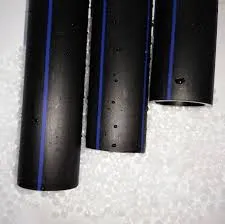វិច្ឆិកា . 21, 2024 19:26 Back to list
hdpe sewer pipe
The Benefits and Applications of HDPE Sewer Pipes
High-Density Polyethylene (HDPE) sewer pipes represent a significant advancement in underground piping technology, offering a range of benefits that make them a popular choice for wastewater management systems. This article explores the properties, advantages, and applications of HDPE sewer pipes, emphasizing how they contribute to sustainable infrastructure development.
Understanding HDPE
HDPE is a thermoplastic made from petroleum, characterized by its high strength-to-density ratio. Unlike traditional materials such as concrete and PVC, HDPE is durable, lightweight, and resistant to various environmental factors. This makes HDPE pipes an ideal choice for sewer systems, where reliability and longevity are critical.
Advantages of HDPE Pipes
1. Corrosion Resistance One of the primary benefits of HDPE sewer pipes is their exceptional resistance to corrosion. Unlike metal pipes that can rust and degrade over time when exposed to moisture and various chemicals found in wastewater, HDPE pipes do not suffer from corrosion. This property ensures a longer lifespan and reduces maintenance costs.
2. Flexibility and Strength HDPE pipes are known for their flexibility and strength. They can withstand ground movement and pressure, making them less likely to break or crack compared to rigid materials. This flexibility is particularly advantageous in areas prone to earthquakes or shifting soil conditions.
3. Low Friction Coefficient The smooth interior surface of HDPE pipes reduces friction, which minimizes the pressure needed to transport sewage and waste. This results in lower energy consumption and improved flow rates, leading to more efficient wastewater management.
4. Lightweight and Easy to Install Compared to traditional piping materials, HDPE is significantly lighter, which simplifies transportation and installation. Fewer resources are required for installation, and labor costs can be reduced, making HDPE an economically viable option for municipalities and contractors.
5. Environmental Impact HDPE is a sustainable material, as it is recyclable and has a lower environmental impact compared to other materials. The manufacturing process of HDPE pipes also produces fewer greenhouse gases. Furthermore, the longevity and durability of HDPE pipes contribute to reduced waste overall.
hdpe sewer pipe

6. Resistance to Chemicals HDPE pipes exhibit remarkable resistance to a wide variety of chemicals, making them suitable for transporting not just sewage but also industrial wastewater. This versatility allows for HDPE to be utilized in various applications beyond sewer systems, including chemical plants and agricultural irrigation.
Applications of HDPE Sewer Pipes
HDPE sewer pipes are widely used in various applications, including
1. Municipal Wastewater Systems Many cities and towns have adopted HDPE sewer pipes for new installations and replacements of aging infrastructure. Their durability and cost-effectiveness make them a reliable choice for managing municipal wastewater.
2. Stormwater Management HDPE pipes are also utilized in stormwater management systems, where they help control runoff and prevent flooding. Their resistance to corrosion and clogging ensures that these systems remain functional and efficient.
3. Industrial Applications Industries that produce wastewater containing harsh chemicals or high temperatures can benefit from HDPE pipes, which can safely transport a wide range of substances without degrading.
4. Residential Plumbing As more homeowners look for ways to improve their plumbing systems, HDPE has become a popular choice for underground pipes due to its resilience and efficiency.
5. Rehabilitation of Old Pipes HDPE can also be used in trenchless technology, allowing for the rehabilitation of existing pipes without the need for extensive excavation. This method helps to minimize disruption in urban areas, making it a favored solution for municipalities.
Conclusion
HDPE sewer pipes represent a modern solution to the challenges faced by traditional piping systems. Their impressive range of benefits—including corrosion resistance, flexibility, and environmental sustainability—positions them as a leading choice in the construction and maintenance of sewer systems. As the demand for efficient, reliable, and eco-friendly infrastructure continues to grow, HDPE pipes will undoubtedly play a critical role in shaping the future of wastewater management. By investing in HDPE technology, municipalities and industries can ensure a cleaner, more sustainable environment for generations to come.
-
HDPE Pipe Fittings: Durable, Leak-Proof Solutions
NewsAug.16,2025
-
Premium CPVC Sheet: High-Temp & Chemical Resistant Solutions
NewsAug.15,2025
-
Durable PPR Pipe for Hot & Cold Water Systems - Easy Install
NewsAug.14,2025
-
Durable HDPE Sheet | Versatile & Impact-Resistant Plastic
NewsAug.13,2025
-
Premium PVC Soft Sheets: Clear, Flexible & Durable
NewsAug.12,2025
-
Premium PVC Round Rods: Durable, Chemical Resistant, Easy to Machine
NewsAug.11,2025

